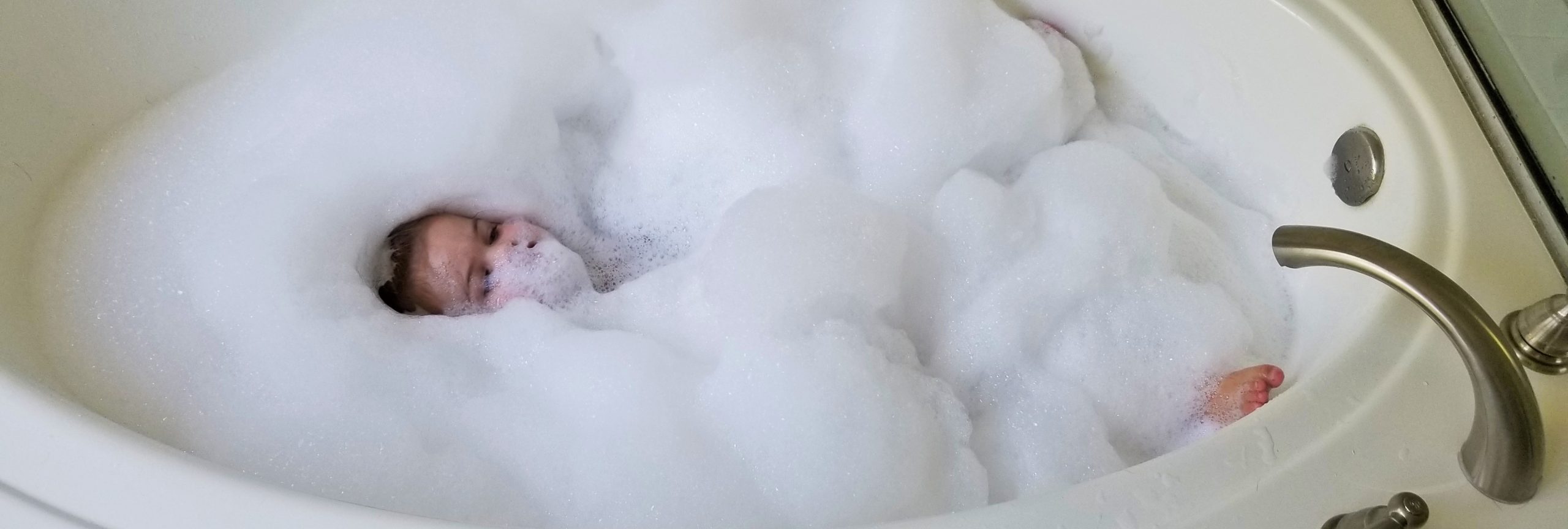
Soap is incredibly easy to work into a scene or conversation. But, as a writer, why would you?
Because—like everything else—soap choices make an impression. “Soap” usually refers to what is technically called a toilet or toilette soap, used for household and personal cleaning. Soap choices reflect at least two things: need and personal preference.
Traditionalists
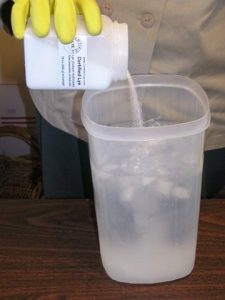
The very first cleaning agents were likely ashes from fires used to cook animals. Fatty acid (which would have dripped from the carcasses onto the fire) and a caustic agent (such as the lye in wood ash) removes dirt from skin and clothing. Soap-making processes have gotten a little more sophisticated in the 5000 or so years since then. I’ll start with two of the oldest soaps made in the United States and still available.
Lava Soap
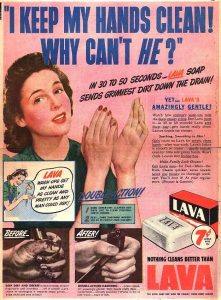
Ground volcanic pumice works as a mild abrasive, ideal for sloughing off viscous grime without removing the skin underneath. Lava is a heavy-duty hand cleaner in soap bar form manufactured by the WD-40 Company. In addition to the typical combination of fatty acid and salt, Lava soap contains ground pumice, which gives the soap its name. The soap and pumice combination is intended to scour tar, engine grease, paint, dirt, whale oil, and similar substances from the skin.
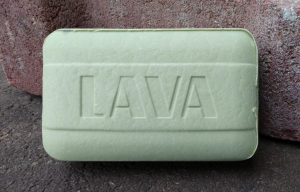
The Lava Bar is a heavy-duty hand cleaner, developed in 1893 with pumice. Do-it-yourselfers, auto mechanics, coal miners, locksmiths, luthiers, and oil rig workers commonly use Lava to scrub off the traces of their work. The original Lava bar was gray and dried the skin. The modern version looks more attractive and contains moisturizers.

So, what sort of person/character would keep Lava around the house? If all you knew about the person was the use of this hand soap, what would you expect regarding age, occupation, gender, education, occupation, etc.? How might those expectations change if it was a well-worn bar of soap or a brand-new bar still in the box?
Ivory Soap
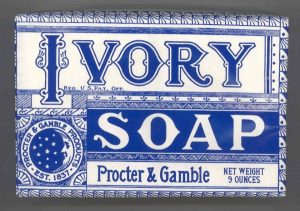
The sons of the original Proctor and Gamble were responsible for the creation of Ivory soap. James Norris Gamble developed the soap with the intention of making mild, effective soap inexpensive enough to be widely available. The name Ivory was created by Harley Procter, who was inspired by Psalm 45:8 in the Bible: “All thy garments smell of myrrh, and aloes, and cassia, out of the ivory palaces whereby they have made thee glad.” In September 1879, Procter & Gamble trademarked “Ivory”, the name of its new soap product.
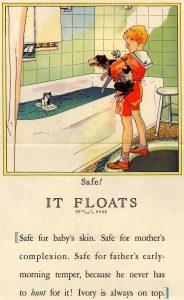
During production, Ivory soap has air whipped into the solution, making the bars buoyant. James Gamble developed the process of adding air during production. When bathing in a murky lake or river or in a tub of bathwater that has already been used by the rest of the family, having soap that floated was extraordinarily convenient. This gave rise to the slogan, “It Floats!” in 1891. In 1992, Proctor & Gamble marketed a new formulation that includes moisturizers but does not float.

So who uses Ivory? This soap has a long-standing image of gentleness and purity. Small children, people with sensitive skin, cleaners who need to avoid residue, and many people who simply prefer inexpensive soap choose it for that reason. What sort of characters might have a bar of Ivory soap in their washroom or liquid Ivory handsoap in the kitchen?
Shaving Soap
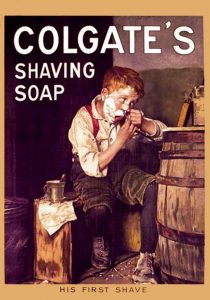
Though it is not typically used as a regular body soap, I’m including shaving soap here for its traditional connotations. Shaving soap is sold as a hard disc or stick that is used with a wet shaving brush to produce lather. The lather softens the hair before shaving and forms a thick, protective layer between skin and blade. Modern shaving cream is more convenient than shaving soap, but it does not work as well for moisturizing or giving a close shave.
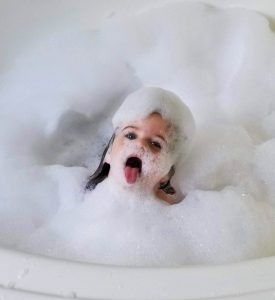
So what sort of character prefers shaving soap to shaving cream? Would you expect old? Or old-fashioned? And would the shaver choose a basic, inexpensive brand like Williams ($1.49 per cake) or something more exotic, like Molton Brown ($65 for one cake in a wooden bowl)? How much is it worth to get a moisturizing lather blended with coconut oil to prep skin for a clean shave, with a top note of mandarin, heart notes of jasmine and violet, and base notes of musk, sandalwood and vanilla, all in a slick shaving bowl?
And what if it’s a woman using shaving soap? Why? And on what part(s) of her body?
Medically Necessary Soap
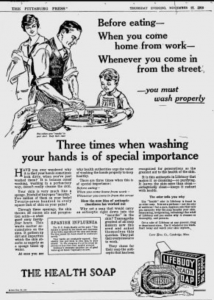
As dermatologists like to remind us, skin is the largest organ in the body. Many skin ailments can be improved or even cured by using particular soaps.
Note: The information provided below is not intended for medical diagnosis or treatment. This is only intended for writing purposes and providing examples.
Dermatologist Recommended
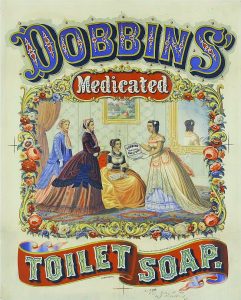
Perhaps your character will do their own research, determining their particular needs and methods of treatment. What sort of person does this? For general use, dermatologists recommend Aveeno, Dove, Olay, and Basis. Skin cleansers are better for sensitive skin, such as Cetaphil, CeraVe, and Aquanil. Deodorant soaps are often very harsh and drying.
Treatment of Skin Conditions
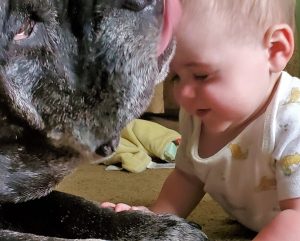
Many skin conditions can be treated topically with soap. Rashes from poison ivy, insect bites, and mild eczema can be relieved with oatmeal soap. Aloe Vera can help with sunburn and acne. Antibacterial soap has been in the news quite a bit lately. There is evidence that the symptoms of severe acne, athlete’s foot, scabies, ringworm, psoriasis, plantar warts can be relieved with prescription-strength medicated soap.
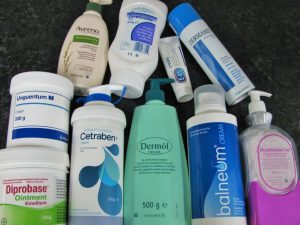
The research on specific drugs and usages is not conclusive for all of these conditions, so be sure to dig around in peer-review medical journals before including details in your writing.
Fancy Soap
Sampling of Soap Types
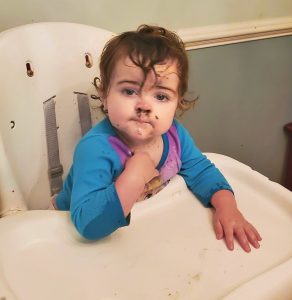
- African black soap, popular in West Africa
- Aleppo soap, popular in Syria
- Castile soap, popular in Spain, hard soaps based on olive and laurel oils
- Marseille soap, popular in France
- Nabulsi soap, popular in Palestine
- Saltwater soap, used to wash in seawater
- Vegan soap, made without use of animal byproducts
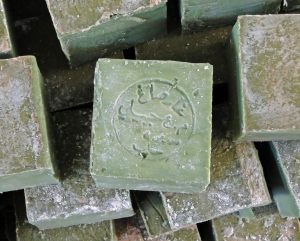
More information on all of these soaps is available online. Every type of soap has a different texture, smell, weight, and other characteristics that can add sensory detail to your writing. Would your character have a signature soap? Chose to make a statement—to self or others?
Expensive Soaps
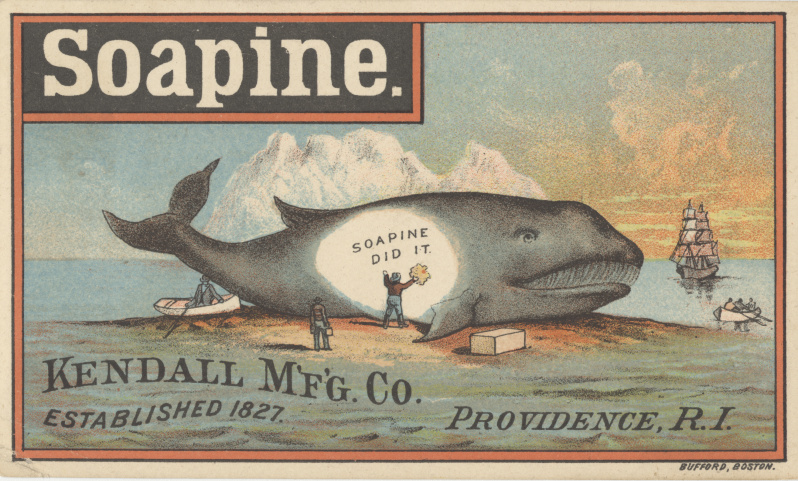
Status symbols only work if other people know about them. Some of the most expensive soaps have distinctive scents. They may provide (mostly subjective) beauty benefits. Prominently displayed wrappers or overseas packaging left ever-so-casually where guests might see them
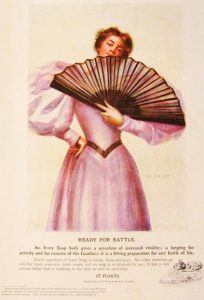
- Qatar Soap: A bar of this soap produced by a family-run business in Lebanon might make you think twice about washing too often. Infused with gold and diamond powder, a single bar costs $2,800 (£1,700; 2,050 euros).
- El-Nino (Kenya) Soap: The soap is part of the Kenya government’s strategy to provide aid for victims of El Nino weather catastrophes. Each piece will retail for $375 (Ksh 37,500). However, it is not yet clear if this soap will be manufactured in Kenya, Lebanon, China or Migingo.

- Cor Soap: Cor was produced by Plank, a company that manufacturers yoga-themed products. Each bar will set you back $125 (KSH 12,500). The ingredients that made Cor expensive are the following:
- Chitosan to even out skin tone
- Sericin — a silk extract — to trap moisture and provide UV protection
- Four types of collagen to help maintain skin structure.
- Silver, a known antibacterial agent
- Cle de Peau BEeaute Synactif Soap: A facial cleansing soap that removes impurities from pores and lifts away makeup and dead skin to reveal purified skin filled with translucence and suppleness. $100.
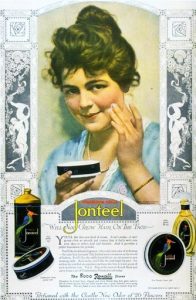
- Erno Lazlo Famous Black Bar: $38 for those who want to go for something a little less high end.
- Dead Sea Mud: Restores skin’s own mineral levels; infused with 26 minerals and has a signature black color that transforms to white foam.
- Glycerin: Attracts and holds hydration for a more moisturized, glowing complexion.
- Palm and Palm Kernel Oils: Regulates skin’s oils and reinforces its defenses against outside stressors.
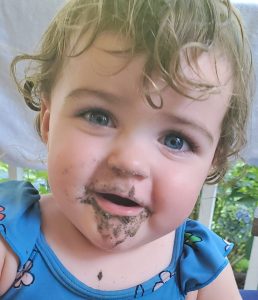
- Dragon’s Blood Cold Process Soap: Loaves / Bars for those who want to sound high end on a budget. Loaves of soap are cut into bars and packed with your own custom label. Dragon’s Blood soap comes in custom sizes, colors, etc. for large orders. The famous fragrance contains “top notes of amber, vanilla, and patchouli. Also has hints of orange and other fruity base notes.” Sample 4.5oz. Bar ($3.50 / unit)
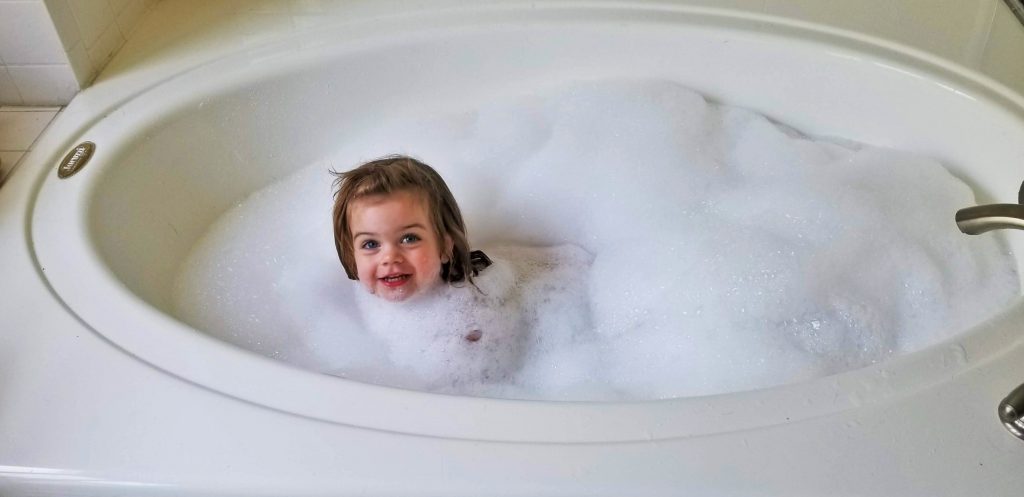
Bottom line for writers: Soap can flesh out a character, either subtly or in a more marked way. Think about it!
